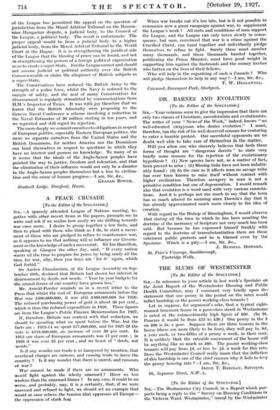A PEACE CRUSADE
[To the Editor of the SPECTATOR.] SIR,—A sparsely attended League of Nations meeting, to- gether with other recent items in the papers, prompts me to write and ask if we realize how easily we are drifting towards war once more. I desire to group together a few facts, and then to plead with those who think as I do, to start a move- ment of those who are pledged to refuse to countenance war, as it appears to me that nothing will so influence our Govern- ment as the knowledge of such a movement. Sir Ian Hamilton, speaking at Glasgow the other day, said, If every nation wants all the time to prepare for peace by being ready all the time for war, why, then you boys are ' for it ' again, which God forbid."
Sir Austen Chamberlain, at the League Assembly on Sep- tember 10th, declared that Britain had shown her interest in disarmament by deeds, not words. " Year by year budgets for the armed forces of our country have grown less."
Mr. Arnold-Forster reminds us in a recent letter to the Press that whilst the cost of European armaments before the War was £460,000,000, it was still £460,000,000 for 1926. The reduced purchasing power of gold is about 30 per cent., which is thus the reduced expenditure in 1926. These figures are from the League's Public Finance Memorandum for 1927.
If, therefore, Britain was content with that reduction, we should be spending what we spent before the War, but the facts are : 1913-14 we spent £77,000,000, and for 1927-28 the vote is £118,600,000, an increase of over 50 per cent. In 1913 our share of European armaments was 17 per cent. ; in 1926 it was over 25 per cent., and we boast of " deeds, not words."
Is it any wonder our trade is so hampered by taxation, that overhead charges are ruinous, and causing trade to leave the country ? Is it any wonder that there is unrest, and rumours of war ?
War cannot be made if there are no armaments. Who would fight against the wholly unarmed ? Have we less wisdom than the unarmed Danes? In any case, it could be no worse,. and probably, nay, it is a certainty, that, if we were unarmed and refused to fight, we should set an example that would at once relieve the tension that oppresses all Europe— the oppression of stark fear
When war breaks out it's too late, but is it not possible to commence now a great campaign against war, to supplement the League's work ? All sorts and conditions of men support the League, and the League can only move slowly in conse- quence, but men, convinced that war is a crime against the Crucified Christ, can band together and individually pledge themselves to refuse to fight. Surely these must number many thousands, and those thousands banded together, petitioning the Prime Minister, must have good weight in supporting him against the firebrands and the money leeches who batten on the lives of their fellows.
Who will help in the organizing of such a Crusade ? Who will pledge themselves to help in any way ?—I am, Sir, &c.,


























































 Previous page
Previous page